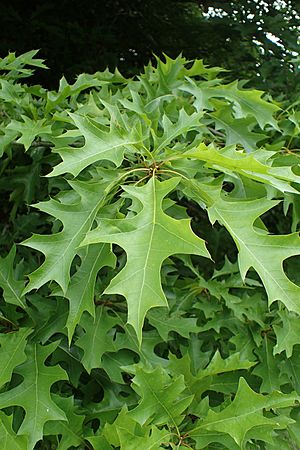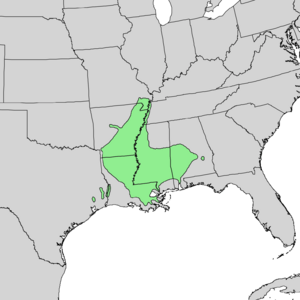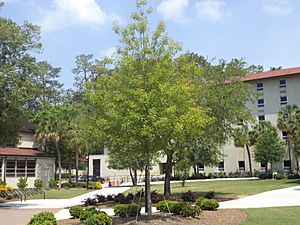Nuttall's oak facts for kids
Quick facts for kids Nuttall's oak |
|
|---|---|
 |
|
| Conservation status | |
| Scientific classification |
|
| Kingdom: | Plantae |
| Clade: | Tracheophytes |
| Clade: | Angiosperms |
| Clade: | Eudicots |
| Clade: | Rosids |
| Order: | Fagales |
| Family: | Fagaceae |
| Genus: | Quercus |
| Subgenus: | Quercus subg. Quercus |
| Section: | Quercus sect. Lobatae |
| Species: |
Q. texana
|
| Binomial name | |
| Quercus texana Buckley
|
|
 |
|
| Natural range of Quercus texana | |
| Script error: The function "autoWithCaption" does not exist. | |
| Synonyms | |
|
List
Quercus nuttallii E.J.Palmer
Quercus nuttallii var. cachensis E.J.Palmer Quercus palustris f. nuttallii (E.J.Palmer) C.H.Mull. Quercus rubra var. texana (Buckley) Buckley Quercus shumardii subsp. texana (Buckley) A.E.Murray Quercus shumardii var. texana (Buckley) Ashe |
|
Script error: No such module "Check for conflicting parameters".
The Nuttall's oak, officially known as Quercus texana, is a type of large oak tree. It grows quickly and is deciduous, meaning it loses its leaves each fall.
Contents
Discovering the Nuttall's Oak
Where Nuttall's Oak Grows
This special oak tree naturally grows in the south-central United States. You can find it mostly in the lower Mississippi River Valley. This area includes states like Louisiana, Arkansas, Mississippi, Alabama, and western Tennessee.
You can also spot Nuttall's oaks in other places. These include eastern Texas, southeastern Oklahoma, and southeastern Missouri. They are also found in far western Kentucky and the very southern tip of Illinois.
What Nuttall's Oak Looks Like
Nuttall's oaks can grow very tall, reaching up to 25 meters (about 83 feet). That's as tall as an eight-story building! They have dark brown bark.
Their leaves are interesting because they have sharp, pointed parts called lobes. These leaves look a bit like those of the Georgia oak or the pin oak.
Why Nuttall's Oak is Special
This tree is known for growing very fast. In the fall, its leaves often turn a beautiful red color. This red color is usually more reliable than what you see on the more common pin oak.
Even though it's a great tree, it's not as well-known in gardening and landscaping. However, it is slowly becoming more popular. People like it because it grows fast and is easy to move and plant in new places. It also has pretty fall colors and can grow well even in wet soil.
A Confusing Name Change
For many years, this tree was mistakenly called Quercus nuttallii. Now, its correct scientific name is Quercus texana.
This change has caused some confusion. Another tree, the Texas red oak, used to be called Quercus texana. But now, the Texas red oak is known as Quercus buckleyi. So, the names got swapped around, which can be a bit tricky to remember!
See also
 In Spanish: Quercus texana para niños
In Spanish: Quercus texana para niños
 | Mary Eliza Mahoney |
 | Susie King Taylor |
 | Ida Gray |
 | Eliza Ann Grier |



